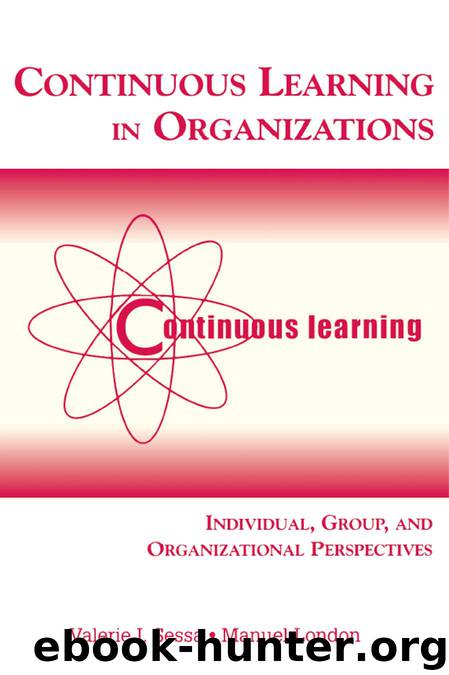Continuous Learning in Organizations by Valerie I. Sessa Manuel London

Author:Valerie I. Sessa,Manuel London
Language: eng
Format: epub
ISBN: 978-1-317-82438-1
Publisher: Taylor & Francis Ltd
STAGES OF DEVELOPMENT AND READINESS FOR LEARNING
A group’s capability of learning may depend on the stage of group development. We consider learning in transitional stages, and then in the more stable stages.
Learning During Transitional Stages
During early stages and the last stage of the life cycle model and during transitional stages of the adaptive and punctuated equilibrium models, groups must learn how to alter their configuration, modify their habits, and reestablish roles and routines. This may be done adaptively, generatively, or transformatively. In adaptive learning, the adjustments are reactive as opposed to proactive. Group members try different patterns with little thought or plan. In generative learning, the group purposely learns how to develop and use contingency plans, perhaps through team training or facilitation. For instance, the group may establish a standard method for integrating new members. In transformative learning, dialogues, appreciative inquiry, and reflection are methods that may help members focus inwardly on group member relationships. However, until the group can (re)solve any internal issues and get itself into a stable state, members will probably have difficulty concentrating on the task at hand and performing optimally.
Kegan and Lahey (2001) build on their individual model of development (see chap. 3) to help groups develop during these developmental or formative phases. They outlined three steps, as follows.
Mutual Regard. The first step is for the group members to develop ongoing regard for each other. Typically, when individuals voice their admiration for one another, they do so in indirect, nonspecific ways that confer attributes. For example, the first author of this book could say, “Manny is a great cowriter of this book. He is so patient, detailed, and smart.” Although many group members would like to hear a little more of this from their teammates, Kegan and Lahey (2001) argued that groups will learn to work together even better if these comments are direct, specific, and nonattributive. To become more direct means to communicate specifically to the person. To be specific is to include detailed information, not global statements that give little if any ideas about what the speaker really values. To be nonattributive is to characterize the speaker’s experience and not the person being attributed. This comes across as more sincere and authentic (especially if delivered in the halting voice). To improve the aforementioned statement, your first author could say:
Manny, I am enjoying cowriting this book with you. I particularly appreciate the system we have set up where I write a messy first draft with no connections between parts and missing information and you take the time to fill in as you rewrite and add your own thoughts and ideas. It has really made a difference to my own thinking and writing, and I think will make this book a good contribution to our field’s understanding of continuous learning.
Public Agreement. The second step is to develop public agreement. At the beginning of new groups, there are often no troubled relationships, harbored resentments, or depreciative gossip. But this may not last. Once the group begins
Download
This site does not store any files on its server. We only index and link to content provided by other sites. Please contact the content providers to delete copyright contents if any and email us, we'll remove relevant links or contents immediately.
Rewire Your Anxious Brain by Catherine M. Pittman(18625)
Talking to Strangers by Malcolm Gladwell(13334)
The Art of Thinking Clearly by Rolf Dobelli(10396)
Mindhunter: Inside the FBI's Elite Serial Crime Unit by John E. Douglas & Mark Olshaker(9302)
Becoming Supernatural by Dr. Joe Dispenza(8188)
Change Your Questions, Change Your Life by Marilee Adams(7721)
Nudge - Improving Decisions about Health, Wealth, and Happiness by Thaler Sunstein(7682)
The Road Less Traveled by M. Scott Peck(7576)
The Lost Art of Listening by Michael P. Nichols(7482)
Mastermind: How to Think Like Sherlock Holmes by Maria Konnikova(7306)
Enlightenment Now: The Case for Reason, Science, Humanism, and Progress by Steven Pinker(7294)
Win Bigly by Scott Adams(7176)
The Way of Zen by Alan W. Watts(6580)
Daring Greatly by Brene Brown(6492)
Big Magic: Creative Living Beyond Fear by Elizabeth Gilbert(5729)
Grit by Angela Duckworth(5581)
Ego Is the Enemy by Ryan Holiday(5395)
Men In Love by Nancy Friday(5219)
The Laws of Human Nature by Robert Greene(5139)
